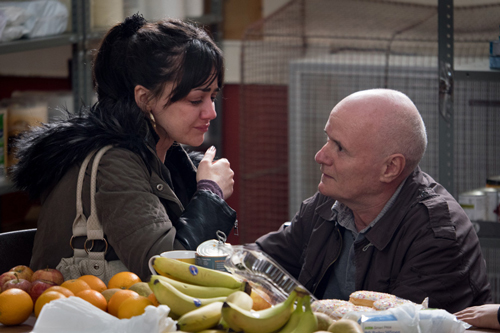Review by EMMET O’CUANA
Director Ken Loach opens his latest cinematic polemic with a simple title sequence against a black screen. We hear two voices speak. Their conversation is initially stilted and formal and then slowly becomes frustrating for both parties. The speakers are an assessment officer for the UK government’s Employment and Support Allowance and Daniel Blake (Dave Johns) a construction site joiner who has recently had a serious heart attack.
The spareness of the film’s opening and the escalation in emotion is instantly compelling. Blake has been medically certified as unfit to work but, in order to qualify for financial support, he needs to prove his case during this interview. The officer asks him a series of questions about his ability to raise his arm, reach into a pocket, stretch his fingers – “We’re getting further and further away from my heart!” Blake exclaims, with typical mordant humour. These are all questions he has already answered on an application form.
His claim rejected, Blake is then required to seek work, despite being medically unfit, just so he can claim jobseeker’s allowance. In addition to the confusing series of assessments and vagueries around when he will be able to speak to someone, he is unfamiliar with computers. The system’s focus on paperless filing effectively freezes Blake out of the appeals process.
Blake witnesses Jobcentre staff threaten a single mother with being forcibly removed for ‘causing a scene’. He adopts the family of Katie (Hayley Squires) and her two children Daisy and Dylan, giving him some purpose and them the help they desperately need. Performing jobs around their council house and acting like a father to the kids gives Blake some small measure of happiness.
 But with no income, Katie is forced to take desperate measures and Blake takes a stand against the system that robs ordinary people of their dignity.
But with no income, Katie is forced to take desperate measures and Blake takes a stand against the system that robs ordinary people of their dignity.
Loach and screenwriter Paul Laverty are not interested in subtlety. At least two scenes verge on diatribe. Such diatribe is necessary as the characters we meet – trapped in the system that surrounds the working poor – speak plainly about their circumstances. In a culture where you are either a ‘striver or skiver’ (think Joe Hockey’s lifter or leaner), there is no room for people who fall outside those terms. Blake demands respect, but is treated like an ungrateful child.
There are a number of scenes in I, Daniel Blake that confirm Loach’s ability to captivate an audience with emotional honesty and simple tragic circumstances. This is a film picked clean of staginess, or inauthentic tub-thumping. A sequence in a food bank plays out with tear-inducing inevitability. Squires in that scene is a revelation, conveying a mother’s deperation to provide for her children.
This is a film for the families on the breadline with no more options; the so-called bludgers who simply need help; the women and men crying out for dignity, and treated like an unwelcome statistic.



Comments are closed.